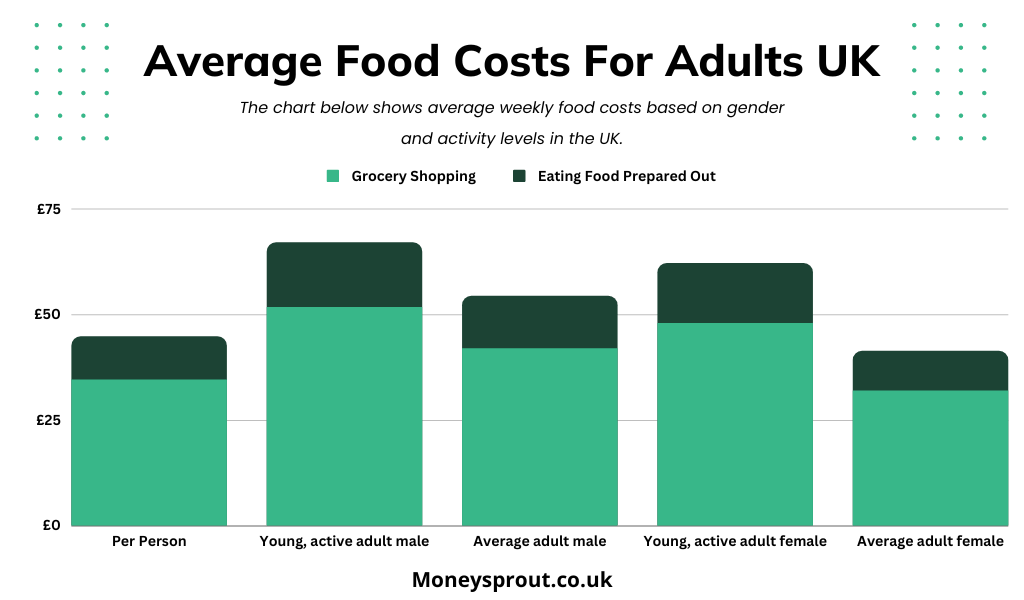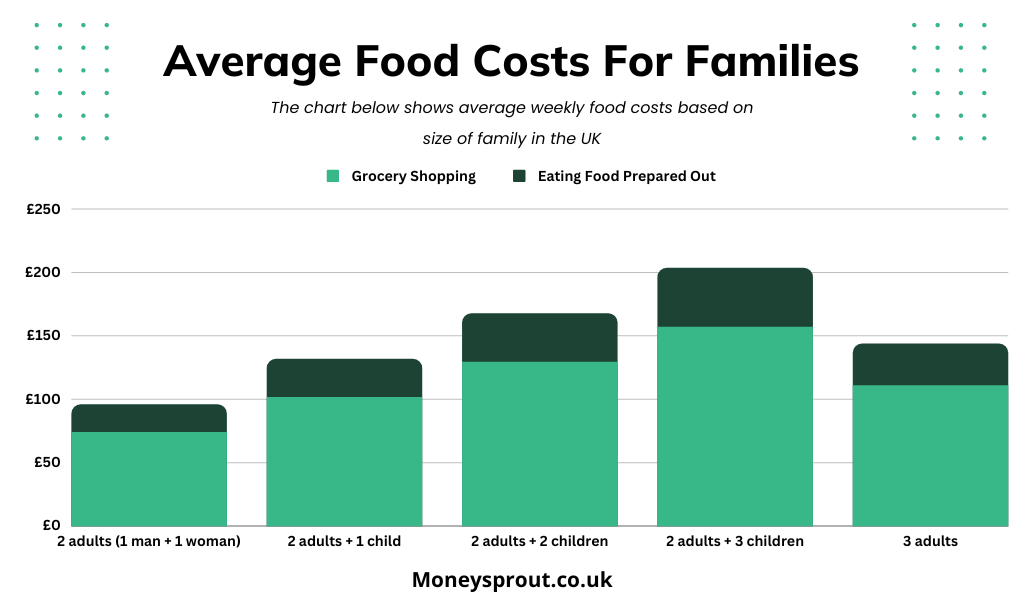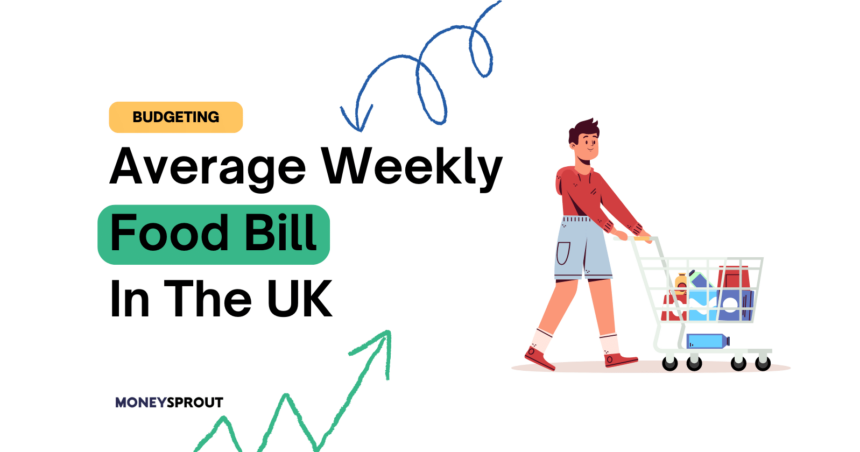Food prices are on the rise. If you feel like your grocery bill gets more expensive by the week, it’s not just you. Inflation in the UK has driven prices to record highs causing our weekly food shops to get more and more expensive.
In this article, we will look at how much individuals and families spend on food each week. You can see if you’re spending more or less than you should be! If you are spending too much, we will give you a few tips on saving money on your weekly shop.
Quick Overview
In the UK the average household is spending £62.20 per week on food and non-alcoholic drinks. The lowest 10% spend £32.50 per week while the highest 10% spend £91.80 per week. The average food bill for a single individual per week is £34.50 per week with another £10.20 spent on eating out.
Key Facts & Figures
- The average UK house is spending on average £62.20 per week according to the latest data from the ONS Family Spending Report
- According to ONS Cost of Living Insights from June 2022 to June 2023 the price of food and non-alcoholic beverages rose 17.4%. Prices in cafes and restaurants rose by 9.1% from June 2022 to June 2023.
- The average household (2.3 People) is now spending £4,124 on groceries and £1,220 on eating out every year.
- In the 12 months leading to March 2023, Trussel Trust saw a 37% increase in food banks usage compared to the previous period.
Average Food Bill For One Person UK
The figures below are based on ONS survey data adjusted for inflation by Nimblefins.
The average cost of grocery shopping for an individual is £34.50 per week. The average person also spends £10.20 on eating food from restaurants or takeaways. This gives us an average food bill of £44.70 per week per person.
However, not everyone’s needs are equal. Eating habits vary between men and women and also vary depending on the level of exercise you do. I’m currently marathon training and the amount of food I eat has increased considerably.
Let’s look at how these food shops differ between genders and activity levels.
| Average Cost of Food per Week | Grocery Shopping | Eating Food Prepared Out | Total Food Bill |
|---|---|---|---|
| Per Person | £34.5 | £10.2 | £44.7 |
| Young, active adult male | £51.7 | £15.3 | £67.0 |
| Average adult male | £41.9 | £12.4 | £54.3 |
| Young, active adult female | £47.9 | £14.2 | £62.1 |
| Average adult female | £31.9 | £9.4 | £41.4 |

The Average food spend for an invidual in the UK is £44.70 per week
These numbers have been compiled based on the average weekly food shop for an average person and then adjusted for caloric needs.
If you’re a young active male, you’re looking at closer to £67 per week and if you’re a young active female you’re looking at roughly £62 per week in food. As someone who trains, I know trying to hit protein goals and eat healthily can be more expensive than eating an average British diet.
Let’s take a look at these numbers over the course of weeks, months, and years.
| Period | Groceries | Eating Out |
|---|---|---|
| Weekly | £34.50 | £10.20 |
| Monthly | £138 | £40.80 |
| Yearly | £1798.93 | £531.86 |
Over the course of a year, an individual will spend on average £2330 on food and eating out.
Average Weekly Food Bill For A Couple
As a couple of one man and one woman, the average weekly food bill would be approximately £95.70. £73.80 is spent on groceries while £21.80 is spent on eating from takeaways and restaurants.
| Average Cost of Food per Week | Grocery Shopping | Eating Food Prepared Out | Total Food Bill |
|---|---|---|---|
| 2 Adults (1 Man + 1 Woman) | £73.80 | £21.80 | £95.70 |
Average Weekly Food Bill For Families
Using the data from Nimblefins we can look at the average food bill across different sized families in the UK. A family of 4 (2 Adults + 2 Children) is likely to spend around £129.20 on groceries per week with another £38.20 being spent on restaurants or take-out food.
| Average Cost of Food per Week | Grocery Shopping | Eating Food Prepared Out | Total Food Bill |
|---|---|---|---|
| 2 Adults (1 Man + 1 Woman) | £73.80 | £21.80 | £95.70 |
| 2 Adults + 1 Child | £101.50 | £30 | £131.50 |
| 2 Adults + 2 Children | £129.20 | £38.20 | £167.40 |
| 2 Adults + 3 Children | £156.80 | £46.40 | £203.20 |
| 3 Adults | £110.80 | £32.80 | £143.50 |

How Much Does The Average Person Spend On Alcohol UK
The average spend on alcohol is £14.30 per week per household. £5 of that is from drinking alcohol out and the other £9.30 is from alcohol in the home. That amounts to a total of £744 per year on alcohol. This represents about 3% of the typical British budget.
When I first saw these numbers I was pretty shocked. I typically would have a drink on the weekends. While the at-home numbers seem about right the numbers from drinking alcohol out were fairly small. After all, a single pint is now more than £5 in most places.
However, this data is based on the broader population. Not everyone drinks. If we saw the data for average spent drinking alcohol out from a pool of people who go out more than 1 time per month I think the numbers would look much different.
Eating In Vs Eating Out
If you want to save money on food, eating out less is the fastest way to do it. Just take a look at the average price of meals depending on whether you are eating, in the house, from a restaurant, or from a takeaway.
Eating In The House – £3-5/meal
Eating Takeaway – £7.93/meal
Eating At A Restaurant – £12-20/meal
As you can see it is much cheaper to eat in the house than it is to eat from a takeaway or eat from a restaurant.
How To Spend Less On Groceries
If food prices are eating into your budget, you are not alone. We have put together 12 tips below to help you save on your groceries each week.
- Plan Your Meals and Stick to a List:
- Knowing what you’ll eat each day means you can buy exactly what you need, reducing waste and impulse buys.
- Buy in Bulk:
- Purchasing items in larger quantities often offers a cost-per-unit saving. Think rice, pasta, lentils, and other non-perishables.
- Opt for Store Brands:
- Supermarkets own-brands often offer similar quality to name brands but at a fraction of the cost. Give them a try!
- Use Loyalty Cards and Cashback Offers:
- Many UK supermarkets have loyalty schemes that can translate to significant savings over time. Also, keep an eye out for cashback offers on apps or credit cards.
- Limit Convenience Foods:
- Pre-packaged meals and snacks are often more expensive than their homemade counterparts. Try cooking from scratch whenever possible.
- Shop Local and Seasonal:
- Buying produce that’s in season usually means it’s cheaper and fresher. Consider visiting local farmers’ markets or joining a community-supported agriculture (CSA) scheme.
- Reduce Meat Consumption:
- Meat can be one of the more expensive items on your shopping list. Consider incorporating more vegetarian or vegan meals into your week.
- Minimise Food Waste:
- Make the most of leftovers, learn to preserve foods, and understand best-before vs. use-by dates. The less you throw away, the more you save.
- Shop During Sales or Discounts:
- Pay attention to supermarket flyers or online deals. Shopping during promotions can significantly reduce your bill.
- Consider Online Grocery Shopping:
- This can help you avoid impulse buys, and you can easily compare prices between different products and stores.
- Use Price Comparison Apps:
- There are several UK-specific apps that compare grocery prices across major supermarkets, helping you choose the most affordable option.
- Buy Frozen Fruits and Vegetables:
- They’re often cheaper than fresh produce and can be just as nutritious. Plus, they won’t spoil quickly.
- Grow Your Own:
- If you have the space, even just a windowsill, growing your own herbs, salad leaves, or even vegetables can be both cost-effective and rewarding.
- Limit Luxury or Non-essential Items:
- Do you really need that premium coffee blend or that expensive snack? Often, we can find alternatives that are just as satisfying but kinder to our wallets.
How Much Are Food Prices Rising (Inflation)
Over the past 10 years you never really noticed inflation. Things crept up slowly over the years and you’d occasionally realise that something is a good bit more than it was 5 years ago. However, in 2023 it seems like every time you pop into the shop, something has skyrocketed in price.
Well, that’s because food prices are skyrocketing and have been since COVID. From June 2022 to June 2023 the price of food and non-alcoholic beverages rose 17.4%.
Food prices are rising due to multiple reasons in the UK:
- Increased energy costs caused by Russia’s invasion of Ukraine
- Supply chain disruption due to COVID & Brexit
- Bad weather affecting harvests
- Rising Labour costs
All of these factors hitting at the same time, make for a nasty rise in prices.
Certain foods have increased more than others.
- Sugar – Up 42.1%
- Milk, Cheese and Eggs – 29.7%
- Oils and Fats – 25.6%
- Pasta Products – 24.1%
As a man who lives on pasta and cheese, these numbers are worrying for my bank balance.
Due to these increases, people are simply buying less food as it’s becoming unaffordable for many. In a recent survey, 47% of adults stated that they are buying less food when shopping. 97% of people surveyed also stated that a rise in food prices was contributing to their rise in cost of living.
How Much Should You Spend On Food?
Everyone has a very different lifestyle, so these budget recommendations are simply rough guidelines for you to work from.
The average UK household is currently spending around 16% of their income on purchasing food and non-alcoholic drinks.
It’s recommended that roughly 10-15% of your budget should be spent on food each month. However, with food costs rising faster than wages, your food may become a larger part of your budget.
If you want to track your spending and get on top of your finances I would recommend checking out our Monthly Budgeting spreadsheet.
- Monthly Budget Overview
- Custom Categories
- Transaction Log
- View Daily Spending Overview
- Track Needs, Wants, Savings/Investments & Debts
Final Thoughts
After looking at the date, there’s no doubt that food prices are on the rise and people are struggling with their weekly shopping. Hopefully, our tips and tricks can help you to decrease your weekly food bill each week.
Read More From Money Sprout:






I was already doing all this before the prices went up. Now what? How about we stop covering for the government with the “it’s all the Russians fault” and actually start recognising that net zero is what is actually contributing most to it.